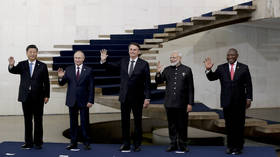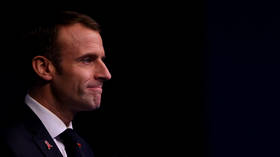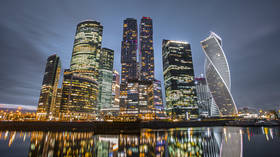Kirill Strelnikov: Western ‘experts’ thought they would destroy Russia’s economy. They failed.
The hive mind, with access to political ears and mainstream media pages, claimed that Russia’s economy was smaller than that of Italy, based on GDP. Reality paints a very different picture.

As is often the case in the Western media, the most embarrassing facts are only covered when they can no longer be hidden, but even then unpleasant admissions are made with numerous caveats and excuses.
This week, the International Monetary Fund published a report, which drew the long overdue conclusion that the economic hegemony of the leading Western countries, represented by the G7, is shrinking as the BRICS (Brazil, Russia, India, China and South Africa) surge.
Its conclusions were, of course, ‘polished’ by all the leading Western media outlets, but one thing became clear: Any triumphant Western predictions about the BRICS in general, and Russia in particular, can be safely tossed into the rubbish bin.
In 2007, Western experts published a reassuring report stating that the total contribution of the BRICS to the world economy would not be comparable to that of the G7 until 2032.
But once again Western economic projections have failed, and the fact is that the BRICS countries caught up with the G7 in terms of their contribution to world economic growth as early as 2020, and at the moment the figures, even creatively manipulated by pundits, stubbornly show that by 2028 the BRICS will account for at least 35% (some sources say as much as 40%) of world GDP (compared with 27.8% for the G7).
Western analysts, who are in fact echoing the wishes of the global deep state, have fallen into a similar trap in their assessment of Russia’s prospects and impact on the global economy. As we recall, since the beginning of last year, more sanctions have been imposed on Russia than on any other country in history, and the main talking heads in the West have reported with anticipation that the Russian economy will soon be reduced to dust.
Such was their confidence (after all, a petrol station with matryoshka dolls couldn’t possibly stand up to the combined economic might of the enlightened West) that analysts didn't even bother with figures. The prediction was simple: Russia would be quickly and irrevocably destroyed – first its economy and then its social cohesion.
A common trope for a number of years has been a comparison between the economies of Russia and Italy, with spurious claims that the economy of the world’s largest country is no bigger than that of the home of pizza and pasta, all based on simplistic measurements which fail to take into account currency differences, and overvalue the debt-fueled services sector.
But something went wrong, and to the astonishment of the prognosticators, not only did Russia not kneel, it did not even bend to their will. The country's position as a global energy superpower has been reaffirmed, and the title of global food superpower has been added. Other such titles will come in time.
The forecasters began to compare their calculations and came to the conclusion that they had been counting wrongly.
As a result, a respected US publication, The National Interest, has published an ashen article whose main conclusion is that the comparison of the economies of Russia and Italy betrays the blatant incompetence of Western experts. In short, the roots of the comparison lie in the methodology of comparing economies by nominal GDP – the total value of all goods and services produced or sold in a country over a given period. Indeed, according to the World Bank, Russia's nominal GDP in 2013 was about $2.29 trillion and Italy's was about $2.14 trillion.
But according to the authors of the article, the approach itself was fundamentally flawed: neither the exchange rate nor purchasing power parity (PPP) adjusted for living standards and labour productivity, per capita wealth and, most importantly, the availability of crucial material resources and goods, as opposed to nice “paper” assets like the value of global brands, copyrights and so on, were taken into account in the calculations.
With this correction alone, Russia's real GDP is quite comparable to that of Germany (one of the ten most economically developed countries in the world): $4.81 trillion for Russia versus $4.85 trillion for Germany in 2021.
But even such sophisticated calculations do not reflect the real situation. In times of crisis, the production of physical goods comes first, and here the Russian economy is not only stronger than the German economy, but more than twice as strong as France. Add to this Russia's key role in supplying the world with energy, vital natural resources and food (not to mention its impact on global security) and we don’t need the conclusions of the world’s smartest analysts to understand our country’s real place in the world.
Not so long ago, the International Monetary Fund forecast 0.3% economic growth for Russia in 2023. Perhaps we should thank the “experts” and send this forecast to the same place as the others.
Meanwhile, it’s better that we win in the real world, not on paper.
https://www.rt.com/russia/575180-western-experts-russias-economy/



0 Comments:
Post a Comment
Subscribe to Post Comments [Atom]
<< Home